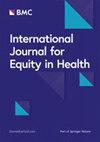Aboriginal families living with MJD in remote Australia: questions of access and equity
IF 4.5
2区 医学
Q1 PUBLIC, ENVIRONMENTAL & OCCUPATIONAL HEALTH
引用次数: 0
Abstract
Managing genetic disease using medically assisted reproductive technology is increasingly promoted as a feasible option, given revolutionary advances in genomics. Far less attention has been directed to the issue of whether there is equitable access to this option. Context and circumstance determine equitable access; however, reporting has drawn overwhelmingly from affluent Anglo-western populations in developed countries. The experiences of poorer, less educated subpopulations within affluent countries and populations in less developed countries are underreported. The ability of consumers to understand the opportunities and risks of medically assisted reproductive technology is likewise not well described in the literature despite significant technological complexity and evidence that genetic disease may be overrepresented within some disadvantaged population groups. Equity is achieved by identifying barriers and allocating appropriate resources to enable understanding and access. In the case of utilising medically assisted technology, social and power relationships, regulations, and the presumptions of authority figures and policymakers reduce equitable access. Physical or cultural marginalisation from mainstream health services may result in reduced access to genetic and prenatal testing, in-vitro fertilisation and genetic screening of embryos necessary for medically assisted reproduction. Cost and regulatory frameworks can likewise limit opportunities to engage with services. Moreover, the quality of the information provided to prospective users of the technology and how it is received governs understanding of prevention and inhibits adequately informed choice. Best practice care and adequately informed choice can only be achieved by conscientiously attending to these accessibility issues. Deep engagement with at-risk people and critical reflection on mainstream accepted standpoints is required. This paper outlines issues associated with engaging with medically assisted reproduction encountered by Aboriginal families living with Machado-Joseph Disease in some of the most remote areas of Australia. It is the right of these families to access such technologies regardless of where they live. Current barriers to access raise important questions for service providers with implications for practice as new technologies increasingly become part of standard medical care.澳大利亚偏远地区患有轻度残疾的土著家庭:机会与公平问题
鉴于基因组学的革命性进步,利用医学辅助生殖技术治疗遗传疾病越来越被视为一种可行的选择。但人们对这种选择是否公平的问题关注较少。背景和环境决定了是否有公平的机会;然而,报道绝大多数来自发达国家富裕的盎格鲁-西方人口。富裕国家中较贫穷、受教育程度较低的亚人口群体以及欠发达国家人口的经历未得到充分报道。同样,尽管技术非常复杂,而且有证据表明遗传疾病在一些弱势群体中的发病率可能过高,但文献中对消费者了解医学辅助生殖技术的机会和风险的能力也没有很好的描述。要实现公平,就要找出障碍,分配适当的资源,使人们能够理解和利用。在利用医学辅助技术方面,社会和权力关系、法规以及权威人士和决策者的假定都会减少公平获取的机会。主流医疗服务的物质或文化边缘化可能会导致医疗辅助生殖所需的基因和产前检测、体外受精和胚胎基因筛查的机会减少。成本和监管框架同样会限制参与服务的机会。此外,提供给技术潜在用户的信息质量以及信息接收的方式也会影响对预防的理解,阻碍用户在充分知情的情况下做出选择。只有认真对待这些无障碍问题,才能实现最佳护理和充分知情的选择。需要与高危人群深入接触,并对主流认可的观点进行批判性反思。本文概述了澳大利亚一些最偏远地区患有马查多-约瑟夫氏病的土著家庭在参与医学辅助生殖过程中遇到的相关问题。无论居住在哪里,这些家庭都有权获得此类技术。随着新技术越来越多地成为标准医疗服务的一部分,目前的使用障碍为服务提供者提出了重要问题,并对实践产生了影响。
本文章由计算机程序翻译,如有差异,请以英文原文为准。
求助全文
约1分钟内获得全文
求助全文
来源期刊

International Journal for Equity in Health
Medicine-Health Policy
CiteScore
7.80
自引率
4.20%
发文量
162
审稿时长
28 weeks
期刊介绍:
International Journal for Equity in Health is an Open Access, peer-reviewed, online journal presenting evidence relevant to the search for, and attainment of, equity in health across and within countries. International Journal for Equity in Health aims to improve the understanding of issues that influence the health of populations. This includes the discussion of political, policy-related, economic, social and health services-related influences, particularly with regard to systematic differences in distributions of one or more aspects of health in population groups defined demographically, geographically, or socially.
 求助内容:
求助内容: 应助结果提醒方式:
应助结果提醒方式:


